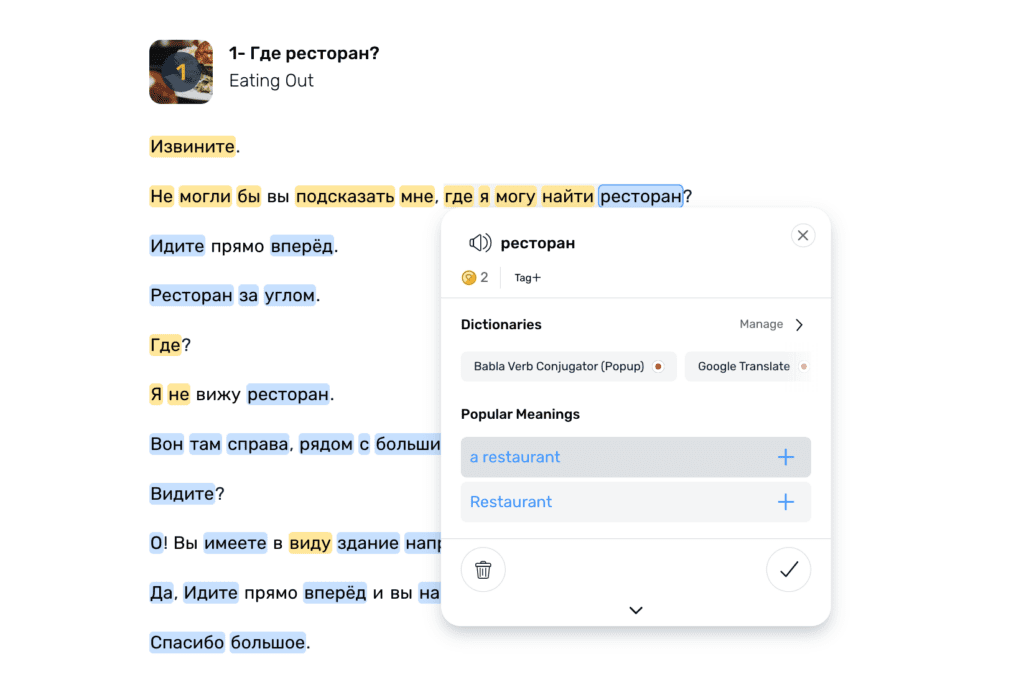How to Say Thank You in Russian
In Russian culture, expressing gratitude for someone else’s work is important and a sign of good manners. While you might already know the basic way to say thank you in Russian, you should get familiar with some more extended ways to express your благодарность (gratitude) for something. This includes thanking someone in particular as well as specifying the reason for your appreciation.
The Basic Way to Say Thank You in Russian
You might already know the most common way of saying ‘thank you’ in Russian and that’s the single word:
СПАСИБО (spah-SEE-buh)
The word actually comes from an old phrase ‘supasi bogu’ meaning ‘(may) god save you’ which was shortened over time. By itself the word ‘спасибо’ will take you pretty far and get your through a majority of situations. However, you’ll probably want to get a bit more specific at times when it comes to showing gratitude and sometimes give an even bigger thanks.

The most common way to boost your gratitude is with the word большое, which simply means ‘big’ in Russian. Because the Russian language uses more free word-order than English, you can большое either before or after the word спасибо.
Спасибо большое ‘thank you very much, thanks a lot’
Большое спасибо ‘thank you very much, thanks a lot’
Which of these two forms that you use is simply a matter of preference or style. Generally speaking, спасибо большое is more common, but no Russian-speaker would think twice about either form.
So, while you can augment your thanks with the word the Russian word for ‘big’ you can extend it even further with other words related to size. For example, if someone’s done you a really large favor and спасибо большое just won’t cut it, you can also use огромное, the word for ‘enormous.’
Огромное спасибо ‘thanks a ton/huge thanks’
Огромное спасибо за помощь ‘thank you so much for (your/the) help’
Learn Russian on LingQ
Immersing yourself in Russian doesn’t require you to travel abroad or sign up for an expensive language program.
However, it can be a bit tiresome to find interesting content, go back and forth between sites, use different dictionaries to look up words, and so on. That’s why there’s LingQ. Check out LingQ today to discover how to learn Russian fast using content you love! You can import movies, podcasts, bookks and much more and turn them into interactive lessons.
Keep all your favourite Russian content stored in one place, easily look up new words, save vocabulary and review. Check out our guide to importing content into LingQ for more information.
LingQ is available for desktop as well as Android and iOS. Gain access to thousands of hours of audio and transcripts and begin your journey to fluency today.
Thanking Someone in Particular
Saying thank you is great, but you should also learn how to thank the specific people you want to show your appreciation to. The rule for this is pretty simple. First, you need to determine your relationship with the person you’re thanking. If you’re close, you can use the ты-form with them. If you’re speaking to multiple people, someone unfamiliar, your boss, or if you’re simply unsure, then you should address someone with вы. The next step is to put whichever form you want to use into the dative case. This also applies to thanking a large group in general.
Спасибо тебе ‘Thank you’ (with friends and family)
Спасибо вам ‘Thank you’ (to multiple people, people with social distance)
Спасибо всем ‘Thank you all’
If you address someone by their name, however, that person’s name DOES NOT change to the dative case. For example, in the phrase, Спасибо Лена the ending of the name ‘Лена/Lena’ remains the same.
Спасибо Лена ‘Thank you, Lena’
Спасибо Виктор ‘Thank you, Victor’
Of course, you can combine these two forms and say both ‘you’ and a person’s name when thanking them. In this case, the rules are the same. The pronouns you (вы/ты) should be in the dative case and the name will not be changed.
Спасибо тебе, Виктор ‘Thank you, Victor’
Спасибо тебе, Анна ‘Thank you, Anna’
Saying Thank You for Something in Russian
Let’s say that someone has given you some good advice and you want to emphasize your appreciation for it. In Russian it’s quite easy to do this. You only need the preposition за which roughly means ‘for’ in this situation.
Спасибо за совет ‘Thank you for the advice’
Спасибо за заботу ‘Thank you for the concern’
Спасибо за сообщение ‘Thank you for the report’
Спасибо за цветы ‘Thank you for the flower’
You may have noticed that all of nouns following the preposition за are in the accusative case. This is important to remember, since ‘спасибо за работа’ would sound very wrong to Russian ears.
You can also thank someone for a specific action. This structure is similar and also uses the preposition за and the words то что followed by the verb. This construction is used less often than за followed by a noun, however.
Спасибо за то, что пришел ‘Thank you for coming’
Спасибо за то, что ты есть у меня ‘Thanks (to the fact) that I have you’
Спасибо за то, что смотрели нас ‘Thank you for watching us’

Other Ways to Say Thank You in Russian
While the word ‘спасибо’ is definitely the most common way to say thank you, Russian does have another word. In more formal situations, people will use the verb ‘благодарить’ which literally means ‘to thank.’ Because the verb already has a formal tone, it often accompanies the word вам. As with спасибо, the person being thanked is in the dative case.
Благодарю вам ‘Thank you’ (more formal)
As with the less formal ‘спасибо’ the verb ‘благодарить’ also uses the preposition ‘за’ to specify the reason for gratitude.
Благодарю за интересную информацию ‘Thank you for the interesting information’
Благодарю за доступное объяснение ‘Thank you for the simple explanation’


